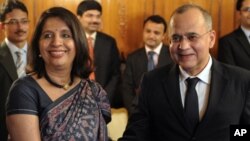India and Pakistan have wrapped up two days of peace talks, with both nations pledging to work together to fight terrorism and resolve the longstanding dispute over the Himalayan region of Kashmir.
In a joint press conference in the Pakistani capital, Indian Foreign Secretary Nirupama Rao and her Pakistani counterpart Salman Bashir confirmed that little movement has been made in resolving the key issue of territorial control of Kashmir, but agreed that they would hold more discussions and keep the dialogue open.
Both India and Pakistan claim Kashmir in its entirety and have fought two of three of their wars over the region since independence from Britain in 1947.
Indian Foreign Secretary Rao emphasized that the road to lasting peace will only be realized if the two nations can talk in an atmosphere free of the threat of terrorism.
"I think we have to build peace and reconciliation step by step...as I mentioned in my earlier remarks...we must do away with the shadow of the gun and extremist violence because it's only in an atmosphere free of terror and violence that we can discuss the resolution of such a complex issue," she said.
The diplomats also discussed boosting trade and the investigation into the 2008 terror attacks in the Indian city of Mumbai. India broke off peace talks with Pakistan after the deadly siege, which was blamed on Pakistan-based militants. The dialogue resumed earlier this year.
While both sides agreed Friday that the two days of meetings had been "productive" and "cordial", critics say little had been achieved in talks.
Former Pakistani ambassador to India, Zafar Hilali, says the fact that the only movement is on minor issues just shows that larger disputes remain out of reach, even if the talks themselves are seen as a step forward.
"Is nothing better than nothing? I don’t know," Hilali said. "They have a deadlock in talks. In fact, these small progress…these small things highlight the fact that the real issues are not being discussed. I don’t think they hide it, I think they highlight it."
Both nations are armed with nuclear weapons, making their relationship have potential global ramifications. But analysts say the competition and animosity between the nations also plays out on a regional level, too.
For the head of the Jammu and Kashmir Muslim Conference, Professor Abdul Gani Bhat, the only way forward is to keep talking. He says the dialogue is vital for not only India and Pakistan but all of South Asia.
"There is absolutely no alternative other than talking, addressing issues and resolving issues in the larger interest of the future India, Pakistan and the entire South Asia region," he said. "As a matter, the resolution of the Kashmir problem is inextricably linked with the survival of the South Asia region."
At the end of the Islamabad talks, both Indian and Pakistani diplomats agreed the dialogue should continue. The two will meet again in New Delhi to set the stage for discussions between both countries' foreign ministers in July.
India, Pakistan to Continue Push for Peace




